What do you do with the remaining peels from citrus fruits like lemons and oranges? Peels from lemons and oranges have many amazing uses, so never throw them away.
Peels from oranges and lemons can be used as natural fertilizer. You believe citrus peels will benefit your plants. This is accurate as, although being a waste product, these peels are non-toxic.
Peels from lemons and oranges add richness to your soil and have the wonderful added bonus of keeping pests away from your favorite plants. As you are aware, bugs are a major issue for you.
I’ll provide you some fantastic ideas for using citrus fruit feelings in your garden in this post.
1. Add Orange And Lemon Peels To Your Compost To Increase Its Richness

For their soil, most gardeners create compost. Their plants will be more successful if this component is added to the soil. Waste materials found in your home are used to make compost.
Peels from citrus fruits, including oranges and lemons, can be added to this compost. Your plants will benefit from the compost’s increased nutritional value when these orange peels are added.
Citrus peels are naturally acidic and a significant source of nitrogen. You must chop the peels into little pieces and thoroughly mix them with the compost before adding them.
When composting citrus peels, keep the compost pile hot and add high-nitrogen materials like animal dung, coffee grounds, and chicken manure. Because bugs don’t enjoy the fragrance of citrus peels, you can keep them away from your composting piles.
2. Using Orange and Lemon Peels to Keep Pests Away

Orange peels are amazing because they contain d-limonene. This substance fulfilled the role of an insecticide. As you are aware, insecticides are used to eradicate various pests that pose a threat to your plants.
You are in danger when bugs are around. Aphids, ants, whiteflies, slugs, and soft-bodied garden pests are among the numerous pests whose neurological systems are harmed by the chemical D-limonene. They are killed by this substance, which also relieves your anxiety.
If you have a plant in your garden that is having pest problems, you can surround it with orange or lemon pieces.
Orange or lemon peels can also be used to make a spray. Making this solution is a fairly simple recipe. All you need is half a cup of peel from lemons or oranges. Now, boil these peels for ten minutes in water.
The citrus peels can be strained out after ten minutes. Now put this solution in your spray bottle and use it once a week on your plants. The fact that D-limonene won’t damage your plants makes this approach extremely eco-friendly.
3. Keeping Dogs and Cats Out

Your dogs might harm your plants in addition to pests. In addition to pests, certain pets, such as dogs and cats, dislike the scent of citrus fruits.
Simply shred some orange or lemon peel and scatter it over the garden; that’s all you need to do. In the event that you are cultivating plants in pots or containers, you can cover them with the peels to keep your pets away from your plants.
4. Avoid Mosquitoes and Sand Flies

Peels from citrus fruits can help you with another issue. The bug repellent spray recipe was previously mentioned. Additionally, this treatment is utilized to repel mosquitoes and sandflies.
You are frequently disturbed by flies and mosquitoes when working in the garden. This remedy will protect your skin from flies and mosquitoes. To keep mosquitoes and fly away from you, apply fresh lemon peels to your arms.
5. Apply Orange and Lemon Peels to Your Garden as Fertilizer
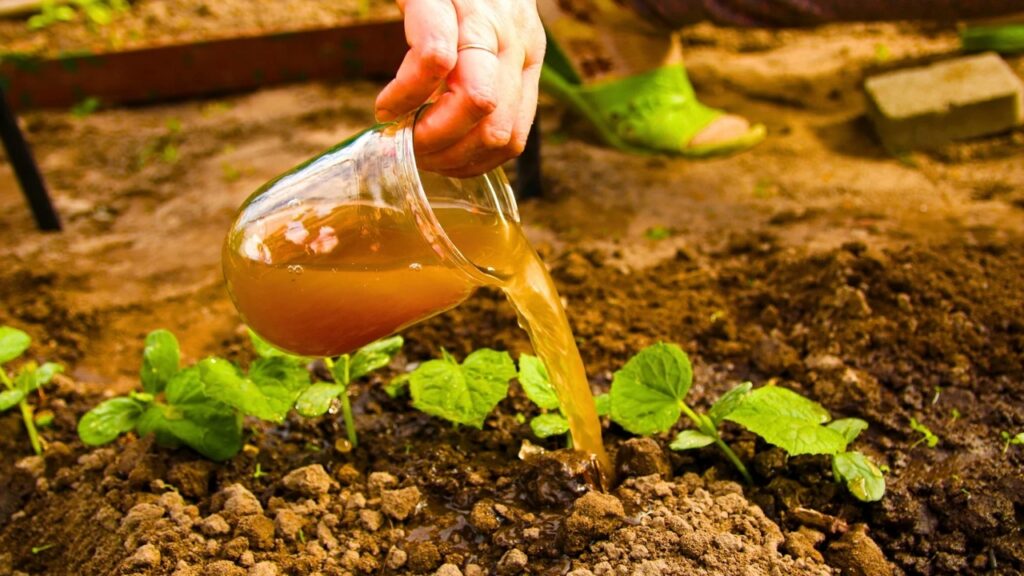
Different nutrients are needed by your plants to improve their health. Nutrients from the earth are continuously absorbed by plants. Thus, the soil is deficient in several nutrients.
You can utilize various organic materials to replenish the nutrient deficit and maintain the soil’s health for your plants. To ensure that there is never a nutrient shortage in your garden, you must regularly amend the soil.
Fertilizer application aids in promoting new development whenever you put new plants in the soil.
High concentrations of sulfur, magnesium, nitrogen, calcium, and other nutrients can be found in citrus fruits like lemon and orange. These fertilizers aid in providing your leafy plants with an immediate boost.
Any fertilizer you purchase from a gardening store contains chemicals that can damage your plants because they can develop quickly and have the potential to burn.
Peels from lemons and oranges are very easy to utilize as fertilizer. Simply chop the peels into little pieces and scatter them over the soil. They will function slowly, supplying the ground with vital nutrients that the plant will progressively absorb.
6. How to Use Lemon and Orange Peels to Make Citrus-Infused Water

We’ve already covered a lot of the advantages of orange and lemon peels. I’ll now explain how to create water that has been flavored with citrus to help your soil.
Your plants will receive an additional nutritional boost when you apply this water to them. Try that and see what happens.
Peels from citrus fruits, like lemons or oranges, are needed to make citrus-infused water. After filling the watering can with water, put the peels inside. Overnight, leave this water can.
Peels immersed in water gradually contain all of the inherent nutrients. Numerous healthy nutrients, including potassium, calcium, and magnesium, can be found in citrus peels.
Your plants are naturally nourished by this water that has been naturally infused with citrus. Therefore, chemical fertilizer is not necessary for your plants. This citrus-infused water is ready to drink in the morning.
Your plant will grow healthier and be more resilient to pests and other illnesses as a result.
7. Seed Starter Pots
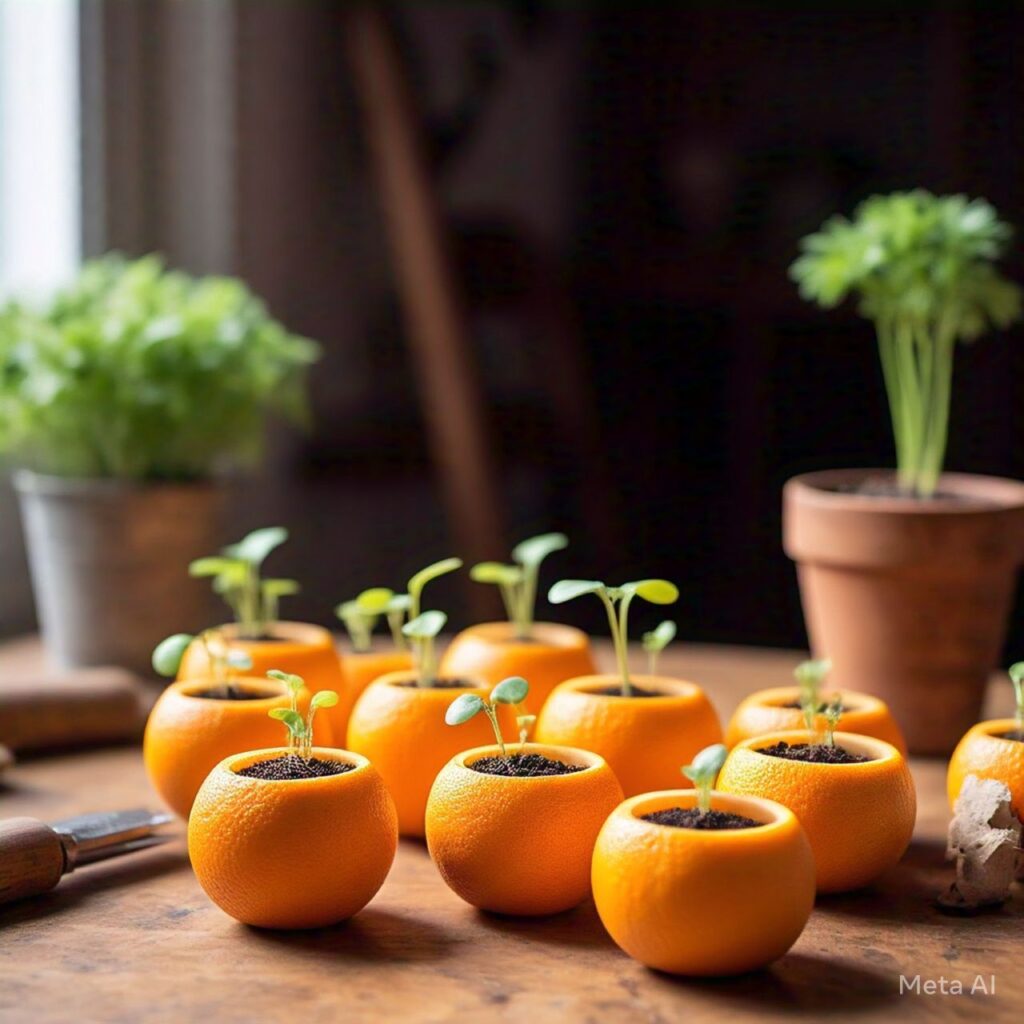
Citrus fruits may serve as seedling pots with ease. Oranges and lemons are good choices for this. To make the fruit you select flat, cut off the very bottom.
Preparing the fruit for seeding is the next stage. Now add potting mix to the rind. Your favorite plant should only have two seeds sown. Your seeds require water at this point in order to readily germinate. The new seedlings will soon begin to emerge from the soil if you keep it moist.
It will take a little while before the seedlings are mature enough to be moved to a permanent spot. Since they are natural seedling pots, you can effortlessly transplant the seedlings using orange or lemon peel. Over time, they will naturally decompose.
8. Attract Butterflies With Orange or Lemon Peels
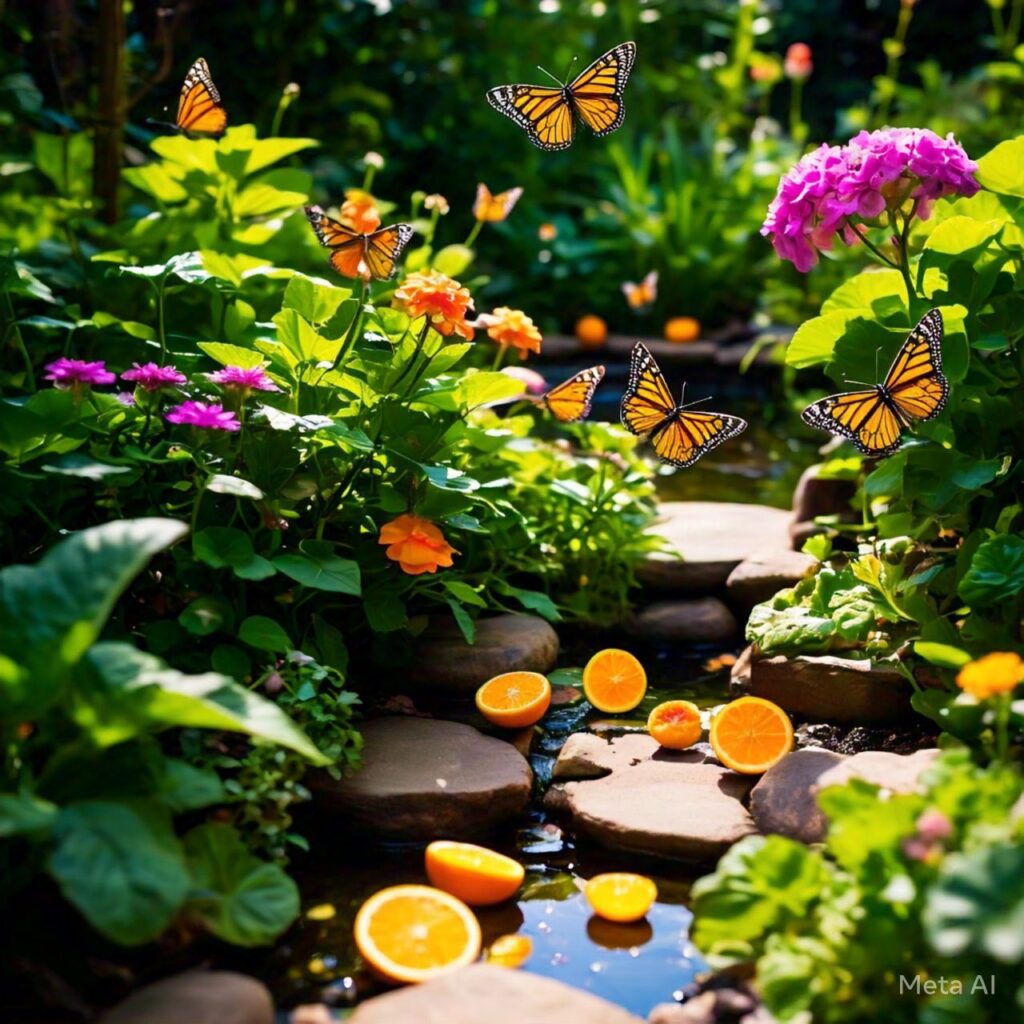
For the majority of plants, pollination is crucial. Peels from citrus fruits can be used to draw pollinators, such as butterflies.
Halve the lemon or orange. Then remove the meat with a spoon, fill these hollowed-out halves with a little water, and set them in your growth space. You’ll notice that they will draw butterflies.
I’ll now share with you another method for drawing butterflies. Simply cut the orange or lemon peels into slices and lay them on flat objects, such as rocks or tree stumps.
Sweet fragrances from citrus peels draw a variety of pollinators. The delicious juices from the peels will attract butterflies. Butterfly presence gives your garden more color.
9. Make the Soil Acidic
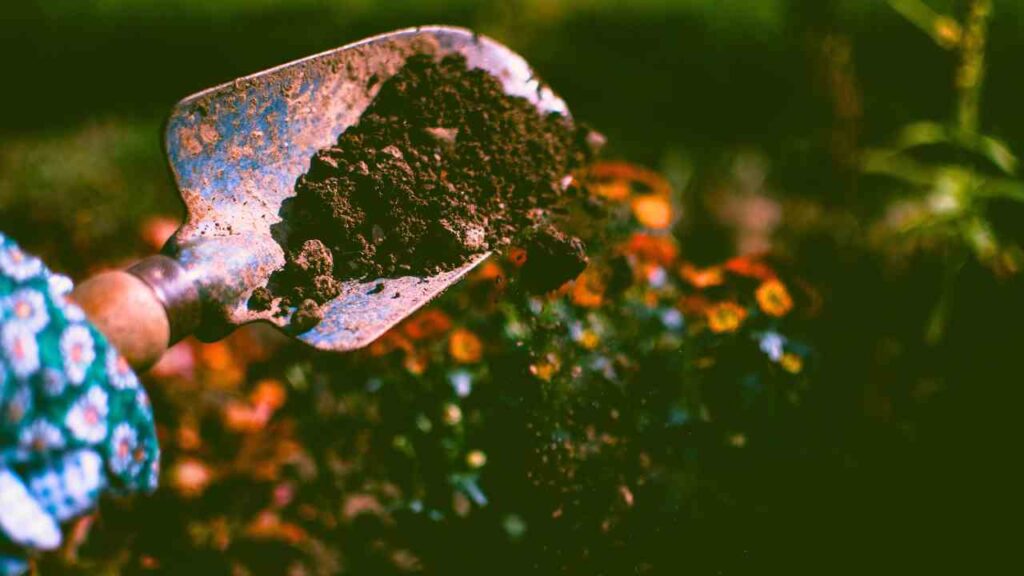
Citrus peel also benefits plants that prefer acid. The soil’s pH is a critical factor. While some plants prefer acidic soil, others thrive in alkaline soil.
The pH of the soil in your garden can be determined using a soil test. With the assistance of a child that is readily accessible in any gardening store, you can complete this test.
Peels from citrus fruits, such as lemons and oranges, can be used to increase the pH of the soil. Dried citrus peels can be used to increase the soil’s acidity, which is beneficial for plants like blueberries, camellias, and azales.
Gather some orange or lemon peels and set them in a bright area. You can grind the peels once they are totally dry. Now take this fine powder and scatter it about the acid-loving plants in the garden. Creating your acid-loving plants this way is incredibly easy and natural.
10. Create an Eco-Friendly Bird Feeder
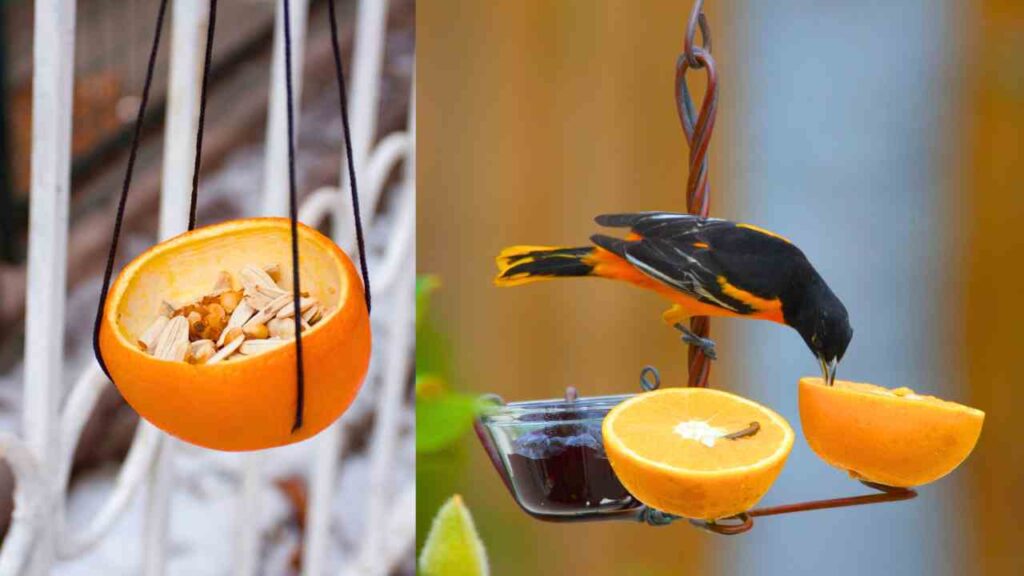
Orange and lemon peels can be used to create a visually appealing bird feeder if you want birds to visit your garden. Having birds in your garden fosters a peaceful and healthy environment.
because you enjoy listening to the sounds of birds. In the morning, a lot of people come to the garden to listen to the birds chirping.
Simply cut an orange or lemon fruit in half and use a flash to create an organic bird feeder. When split in half, the peels resemble a little bowl.
Now secure the ends of these peels with strings. Now add some bird seeds to these gorgeous bird feeders. These natural feeders will attract birds to your garden.

